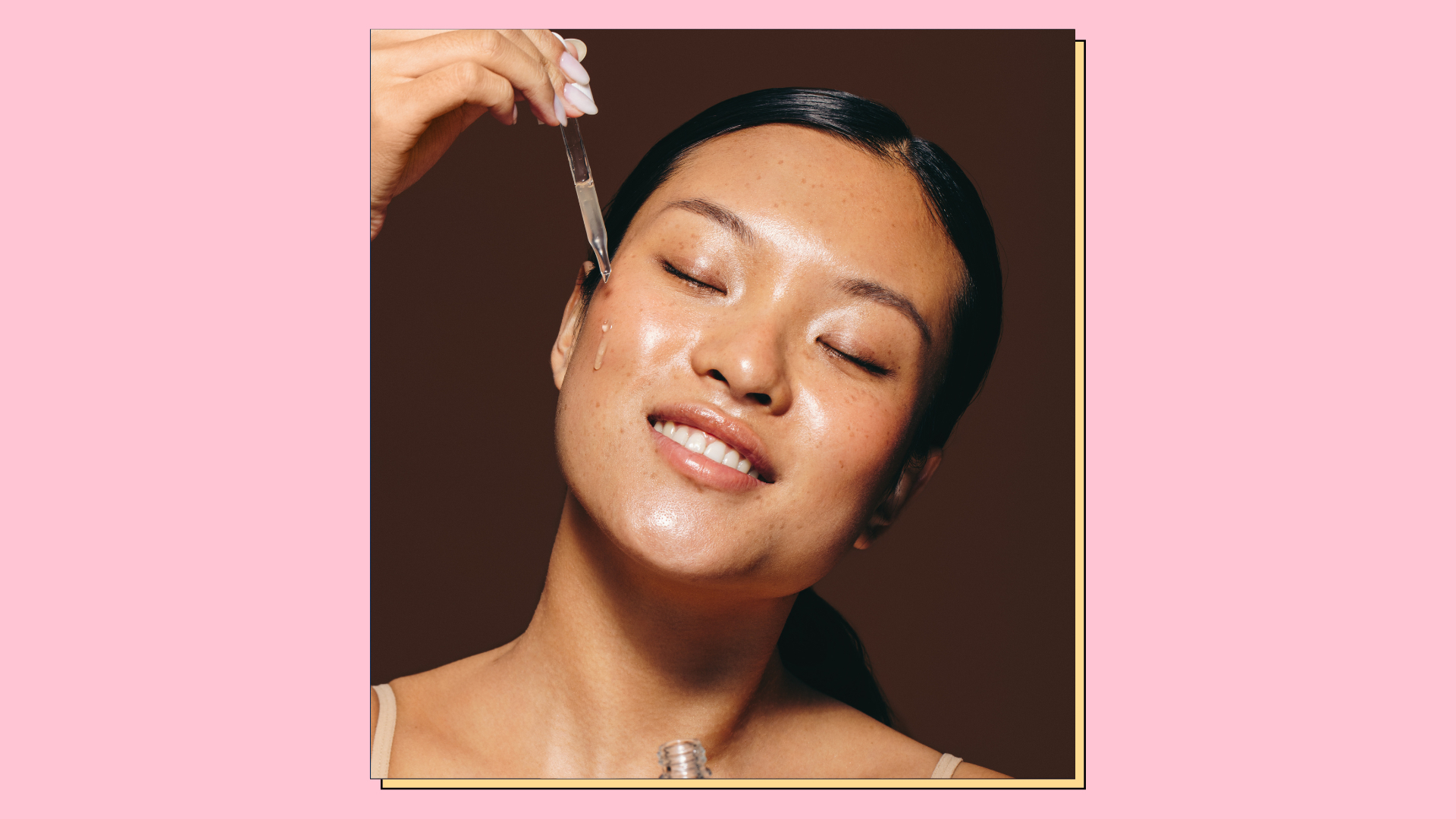Weighing up hyaluronic acid vs retinol? These two ingredients are actually quite different
When it comes to the choice between hyaluronic acid vs retinol, which one is best for your skin? We spoke to the experts to find out exactly how each one works


You've probably heard these two ingredients being spoken about by skin experts and beauty editors, but when comparing hyaluronic acid vs retinol what are the differences between them—and what does each one actually do?
Both the best retinol serums and the best hyaluronic acid serums are seen as But is one better than the other, and who should be using each one? Well, it turns out that while they both have strong uses in their own right, it can actually be advantageous to use them both together in your skincare routine.
We’ve asked skincare expert Dr. David Jack to give us the lowdown on hyaluronic acid vs retinol, so that before you add either to your morning or evening routine, you can discover which active is right for your skin and how to use them. Spoiler: like we said above, it may well be both!
Meet the experts on retinol and hyaluronic acid
Dr. David Jack is an aesthetic doctor with his own clinic on Harley Street as well as an eponymous skincare brand. Ahead, he's broken down who can benefit most from both hyaluronic acid and retinol, as well as their key differences and similarities.
Hyaluronic acid vs retinol explained by an expert
What is retinol?
The umbrella term for vitamin A derivatives is retinoids, one of which is retinol (read about retinol vs. retinal here if you want to know more about how two key retinoids differ).
It’s the more potent of the forms that are available without a prescription and when applied to the skin, it converts into retinoic acid. "It’s the retinoic acid that works its magic on your skin cells, and is the reason retinol has become a gold standard skincare ingredient," Dr. Jack confirms.
What are the benefits of retinol?
There are seemingly endless benefits to using retinol. "It speeds up cell turnover—the skin's natural shedding and regenerating process—stimulates skin firming and wrinkle-busting collagen and elastin production, quells pigmentation, tightens pores, regulates oil production and even treats acne", explains Dr. Jack.
According to Harvard Health, you'll need to use retinol for around six months before you start seeing any serious results—with the very best results normally seen around 12 months after you start using the product. In short, it's well worth persevering to see the benefits of retinol!
Are there any side effects to using retinol?
As a powerful active, products with retinol can come with some side effects. And while all skin tones and types can use retinol, side effects vary depending on what percentage of retinol you use, and how you go about using it.
"Dry and sensitive skin types should start a 0.3% dose, normal skin types can begin at 0.5%, while oily skin should tolerate 1% well," Dr. Jack explains. "For extra caution start slowly, by using your retinol at night once or twice a week and build up use gradually, to avoid side effects like retinol peeling, redness, and dryness."
You can buy different percentages of retinol at lots of different beauty brands, including The Ordinary, The INKEY List, and Paula's Choice. And if you're unsure of how to start using retinol, our in-depth guide covers more of the need-to-knows.
And if your skin can't handle traditional retinol, you can also try the natural alternative that's becoming a lot more popular—bakuchiol. While not exactly the same, of course, it does come with some similar benefits.
What is hyaluronic acid?
"Hyaluronic acid (HA) is made from amino acids and sugar molecules, and acts as a natural ‘humectant’, meaning that it draws water to itself," says Dr. Jack. "It can hold 1,000 times its weight in water and, alongside collagen and elastin, it helps support tissue structure—resulting in smoother firmer skin."
In the same way that collagen and elastin production decrease as we age, so too does how quickly our skin produces its own natural hyaluronic acid—which is where topical skincare comes in handy. As our doctor explains: "The makeup of synthetically produced HA is exactly the same as our own natural HA, and works in the same way by drawing water to the skin."
What are the benefits of hyaluronic acid?
Like retinol, all skin tones and types can reap the benefits of HA, which according to Dr. Jack include: "its ability to increase the moisture content of the upper layers of the skin by virtue of its humectant effect. This will leave skin plump, smooth, and revitalized.
As for if hyaluronic acid is good for acne? "Not only is the ingredient beneficial for dry skin types, it’s actually a dream hydrator for acne-prone skin that doesn’t tolerate nourishing oils well too," says Dr. Jack. "Not only that, but it also has skin repair mechanisms thanks to its antioxidant properties, so it’s able to neutralize free radicals that cause tissue damage and in turn aging."
What are the side effects of hyaluronic acid?
Hyaluronic acid is widely considered to be one of the gentlest skincare ingredients out there. Generally, it doesn’t irritate or cause breakouts and it doesn’t aggravate eczema, or rosacea either—meaning it may be better for those with much more sensitive skin when compared to retinol. However, "It’s important to check what other ingredients your HA-based moisturizer or serum is made up of, as other ingredients such as preservatives can cause the skin to react," Dr. Jack notes.
And what of the recent grumblings from those that claim topical HA is a superficial hydrator? That it simply draws moisture from the deeper layers of the skin depriving it of hydration while hydrating the upper layers in order to offer a glowing complexion? "Not true at all. It derives some water molecules from the deeper layers of the skin and some from the atmosphere," Dr. Jack confirms. "Since water diffuses into tissues from the blood this will quickly be replaced."
Hyaluronic acid vs retinol: the expert verdict
The answer to the hyaluronic acid vs retinol debate is not simple because, as you might have cottoned onto, these two ingredients achieve very different benefits in the skin. While hyaluronic acid works its repairing and hydrating magic on the upper layers of the skin, retinol is able to have multiple effects deeper within the skin.
"Not only does it boost the body’s own hyaluronic acid production, but it neutralizes damage-inducing free radicals, increases cell turnover, stimulates collagen, reduces sebum production, and suppresses melanin formation," Dr. Jack says. "And while people with very dry skin would benefit most from hyaluronic acid, everyone else—especially those with acne—should opt for retinol as it has much more potent and widespread effects on the skin."
The good news for your skin (but perhaps not for your bank balance), is that there is really no need to pick between the two. Much like hyaluronic acid vs niacinamide, retinol and hyaluronic acid interact well with one another. For dry skin types in particular, "applying a hyaluronic acid serum pre-retinol will help alleviate some of retinol’s infamous side effects," Dr. Jack adds. Therefore, it's not necessarily a case of retinol or hyaluronic acid, but maybe both!
Amerley is an award-winning beauty & lifestyle journalist who has been writing for the UK’s most well-known glossies, websites and newspapers for over a decade. Known for her ability to predict the next big trend, there is really very little she won’t try for a story. From microblading and injectables, to10 step skincare plans and breathing her way to better skin, Amerley loves to share her experiences and write relatable, informative and trend-led copy for beauty novices and junkies alike.
